"How does personality, skills, and interest relate to career choices?" Uncover the connection and make a career choice that resonates with your true self.
What you will learn:
- How the OCEAN personality model can help you choose the right career option
- Personality mapping for lawyers, engineers, doctors, creative careers, and entrepreneurs.
- Unlocking career potential with personality
Ever asked yourself, "What career is right for me?" or "How do my personality, skills, and interests relate to my career choices?" If so, you're in the right place. You can use your personality traits to understand which of the different types of careers suit you best - is it a lawyer, an engineer, a doctor, a creative professional, an entrepreneur, etc.?
For this, we will use the OCEAN model of personality, one of the most scientifically backed models of personality testing, used by psychologists, academicians, and HR practitioners across the globe. The OCEAN model, also known as the Big Five Model, helps us understand the unique complexities of our personality. In other words, it is a test to see which job fits you the most.
In this article, we will examine the personality traits required for different professions and guide you toward a career that aligns with your unique personality.
Personality mapping for 5 common career choices
 Lawyers
Lawyers
The legal system in any country rests on the shoulders of lawyers - and a lawyer’s success depends on their core personality types and skills. Let’s dive deep into their personalities and see if it’s best suited for you -
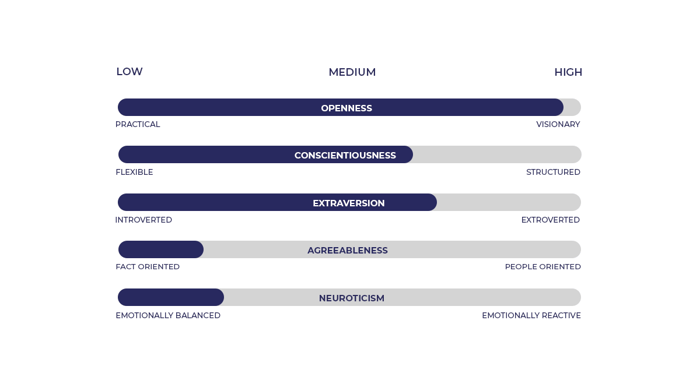
Openness: In the legal world, a higher degree of openness is considered a significant asset. It means you're always ready to listen to different opinions and learn new things. This trait will empower you to think outside the box, offering innovative solutions to legal challenges. Your openness to new ideas can pave the way to effective problem-solving in your legal career.
Conscientiousness: A balanced approach to conscientiousness is crucial in law. Being conscientious in law means you're careful and pay attention to details, but you also know how to manage your time well. You're organised but also flexible, making sure you do your job right without dwelling on smaller hurdles.
Extraversion: In law, a balanced level of extraversion is essential. It's good to be confident and be able to talk to people easily, but it's also important to be a good listener and think deeply. This balance helps you work well with clients and others while still being able to focus on the details of your cases.
Agreeableness: While lawyers are empathetic and cooperative, a slightly lower level of agreeableness is often observed. Lawyers are understanding and can work well with others, but they also know when they need to maintain a firm stance. This means you might not always try to make everyone happy, but you're focused on making fair and just decisions.
Neuroticism: In the legal field, you need to maintain a handle on your emotions. There’s no room for neuroticism in the legal profession. You'll face stress, but it's crucial not to let it cloud your judgement. As a lawyer, you'll meet diverse clients with unique concerns, not to mention sometimes unfair opponents. Keeping a calm demeanour, even in tough situations, is essential. It's all about representing your clients effectively, ensuring their needs are met. Even when facing a loss or handling a challenging case, your resilience and ability to learn from each situation will set you apart.
 Engineers
Engineers
Engineers create innovative solutions to technical problems. Let’s explore the personality traits of engineers:
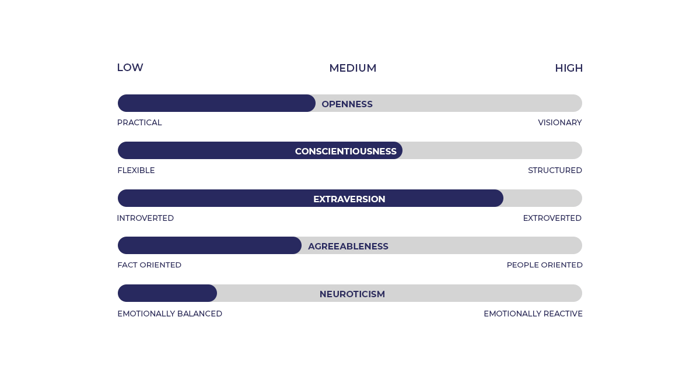
Openness: Engineers generally have a lower level of openness, but it is important to put this into context. They might not be open to a random suggestion because they lean toward tried-and-true methods to ensure the reliability and efficiency of their work. This approach minimises risks, ensuring stable and dependable project outcomes. While they might lack openness in this regard, successful engineers also display a complete readiness to embrace innovative solutions, new ideas and technologies. This helps enhance problem-solving skills. Bottomline – engineers are not very open to other people, but they are indeed open to advancements in their field.
Conscientiousness: As an engineer, having a balanced level of conscientiousness is essential. It means you're disciplined and organised, able to plan effectively, and stick to schedules. You know how to manage your tasks and responsibilities, ensuring that projects are completed accurately and on time. Even though you’re organised, you can adapt to changes and unexpected situations, finding solutions to keep things on track.
Extraversion: In the engineering world, extraversion goes a long way. It's not just about enjoying being around people; it's about collaborating and communicating effectively with your team and clients. You might find energy and inspiration in interactions and discussions, helping you to brainstorm and refine your ideas and projects. A balance between introversion and extraversion with a slightly higher level of extraversion is often seen in a successful engineer.
Agreeableness: Engineers generally rank below average on agreeableness. As an engineer, you understand the importance of teamwork, but you also know when to prioritise the project’s needs over consensus. You're focused on finding the most efficient and effective solutions, even if it means making tough decisions that may not please everyone.
Neuroticism: As an engineer, it is essential to make traits like calmness and positivity your besties. Engineers generally rank low in Neuroticism. As an engineer, you embrace teamwork and diverse opinions, ensuring a harmonious workspace and face hurdles with positivity and a rational mindset, keeping your commitment unwavering. Your resilience will fuel advancement for you and your field.
 Doctors
Doctors
Doctors play a crucial role in healthcare, requiring specific personality traits and skills. Here are some key pointers for doctors:
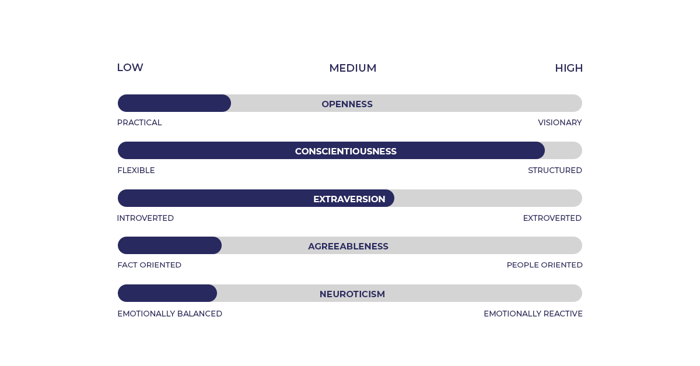
Openness: If you're leaning towards a career as a doctor, know that a practical and reliable approach is often more valuable than constantly seeking new and abstract ideas. It's about prioritising established and proven methods that ensure the safety and effectiveness of patient care. Your focus will be on delivering trusted and tested solutions, which is crucial in providing dependable healthcare. Thus, Doctors are generally low in openness.
Conscientiousness: In medicine, being highly conscientious is vital. You'll need to be disciplined and committed to providing organised and timely care to your patients. Your ability to plan effectively and stick to schedules will play a significant role in ensuring consistent and reliable healthcare delivery.
Extraversion: As a future doctor, balancing extraversion is key. You'll be interacting with a diverse group of people, and effective communication will be essential. While actively engaging with patients and colleagues, you'll also need to value introspection and thoughtful analysis to offer comprehensive and considerate patient care.
Agreeableness: Embarking on a medical career means understanding the importance of making prompt and tough decisions that favour the patient’s health. While cooperation and understanding are crucial, your primary focus will be on ensuring optimal healthcare, even if it means making hard choices. Doctors are thus generally below average in agreeableness.
Neuroticism: As you make life-altering decisions as a doctor, your focus on providing the best care without succumbing to anxiety is essential. Your patient interactions demand patience and empathy, ensuring their comfort and support. Any neuroticism might come in the way of you doing your job. In a field marked by both triumphs and setbacks, maintain your optimism and resilience. Handle every situation with grace, ensuring your professional responsibilities always take precedence.
 Creative Career
Creative Career
Professions in the content/creative space encompass various innovative endeavours. Here are some personality traits of professionals in this field:
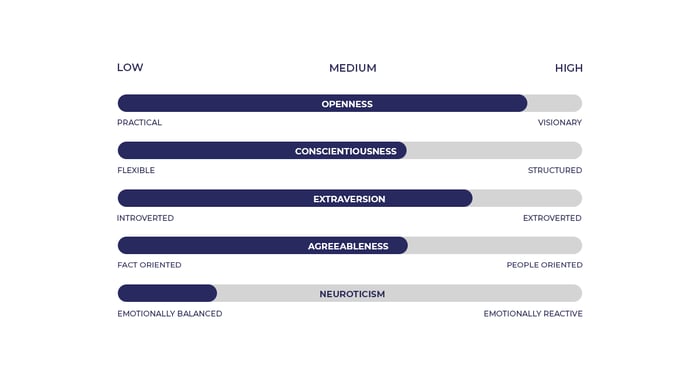
Openness: In a creative career, a high level of openness is your ally. It's about continuously seeking fresh and innovative ideas. Your curiosity and active imagination fuel your creativity, allowing you to explore diverse and abstract concepts. This trait will enable you to push boundaries and create original and impactful work.
Conscientiousness: As a creative professional, maintaining balanced conscientiousness is essential for efficiently managing time and resources. It means you're disciplined and organised but also flexible and adaptable. You can plan your projects effectively while remaining open to unexpected changes and inspiration, ensuring a harmonious blend of structure and spontaneity in your creative process.
Extraversion: While introverts can certainly excel in creative fields, a slightly higher level of extraversion can be advantageous for creative professionals in terms of networking, pitching ideas, and collaborating with others. Creative professionals often need to engage with various people to get inspiration for their work and sell their ideas to clients or teams.
Agreeableness: In a creative career, balanced agreeableness is key. It's about understanding and valuing the perspectives of others while also honouring your own creative vision. You strive to create work that resonates with others, but you also recognise the importance of staying true to your artistic expression.
Neuroticism: A secret to having a career in the creative field is to have a low level of neuroticism. When presenting your creations, patience and stability are critical and help you to navigate diverse opinions and feedback. The world of creativity is a roller coaster of rejections and approvals. Keep your passion alive, stay committed to your craft, and let your unique style shine without letting negative commentary depress you or hold you back from creating from a positive place.
Entrepreneurs
Entrepreneurs possess unique personality traits and skills that drive their success. They usually rank high in openness and extraversion. Here is a detailed personality mapping of entrepreneurs:
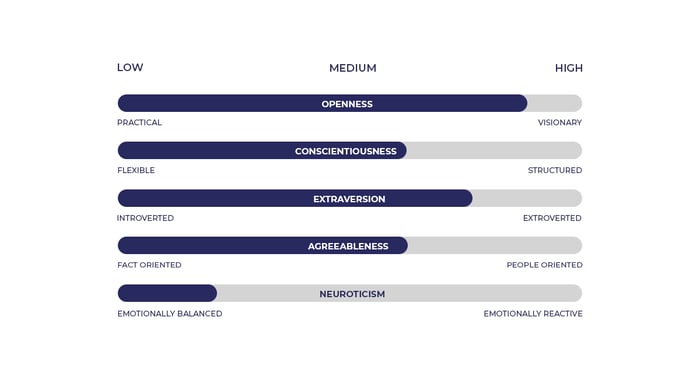
Openness: In entrepreneurship, a high level of openness is a significant asset. It's about your relentless pursuit of novel ideas and innovative solutions. Your adventurous spirit and eagerness to explore uncharted territories drive your entrepreneurial journey, leading to groundbreaking and original ventures.
Conscientiousness: As an aspiring entrepreneur, a balanced level of conscientiousness is crucial. Your ability to maintain discipline, organisation, and forward planning is paramount. This trait ensures that you can navigate the complexities of entrepreneurship, staying committed and focused on your goals, even amidst the unexpected challenges that will inevitably arise.
Extraversion: In the entrepreneurial world, a higher degree of extraversion is beneficial. It's about actively seeking and thriving in interactions and experiences that fuel your creativity and expand your network. Your ability to connect with others, share ideas, and gather insights is a cornerstone for building and growing your entrepreneurial ventures.
Agreeableness: As an entrepreneur, a moderate level of agreeableness is valuable. It's about fostering positive relationships, understanding the needs of others, and creating solutions that benefit not only your business but also the community and your customers. While ensuring everyone's satisfaction, you also maintain a clear vision and direction for your own enterprise.
Neuroticism: As you make crucial business decisions, your ability to stay composed and rational is vital. Your interactions with partners, employees, and clients require clear communication and a collaborative spirit, ensuring everyone’s on the same page. In the world of entrepreneurship, where ups and downs are the norm, your resilience and positive outlook will carry you through. Entrepreneurs thus exhibit low levels of neuroticism.
Unlocking Your Career Potential with Your Personality
Every individual possesses a unique set of traits and talents inherited from their parents in the form of genes. Understanding your genetic predispositions enables you to leverage your innate strengths while working on your weaknesses. This approach allows you to nurture your personality to its fullest potential.
This self-awareness is a valuable tool for making career choices that align with your personality traits and skills. Such alignment can lead to increased job satisfaction, professional growth, and overall happiness. Advanced techniques in behavioural genetics and AI-driven psychometrics based on the gold standard of personality assessment - OCEAN, provide a scientific perspective for self-reflection. They enable you to map your inherent traits with your chosen career paths, ensuring not only professional success but also personal fulfilment.
Whether you’re an aspiring lawyer, engineer, doctor, creative professional, entrepreneur, or any other career, recognising your unique personality traits can be the key to unlocking a career that truly resonates with you. As you become more self-aware, you must remember that the right career choice is more than financial success or societal recognition, it’s where you thrive and find genuine satisfaction.






Leave a Comment